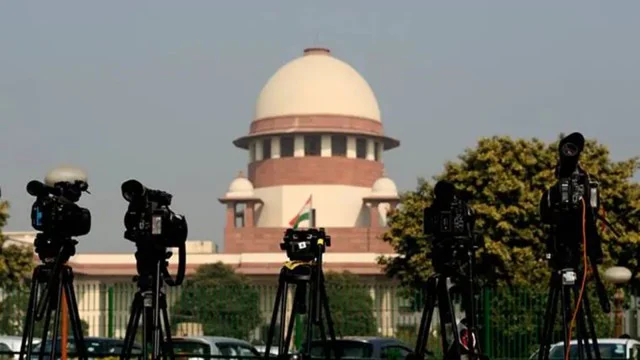On Monday, the Supreme Court assumed jurisdiction over all proceedings previously before the Calcutta High Court regarding conflicting rulings by a single bench and division bench on a petition alleging irregularities in medical admissions at state-run medical colleges and hospitals in West Bengal.
A five-judge panel led by Chief Justice of India D Y Chandrachud announced they would review the case again in three weeks. The bench, which included the court’s four most senior judges—Justices Sanjiv Khanna, B R Gavai, Surya Kant, and Aniruddha Bose—had halted proceedings on January 25. They declared, “The proceedings in the writ petition (before the single bench)… under Article 226 of the Constitution and in the Letters Patent Appeal (before the division bench)…are transferred from the Calcutta High Court to this court. All parties must complete their pleadings within three weeks.”
Senior Advocate Maninder Singh, representing an SC/ST group trust, revealed that a scrutiny committee discovered 14 out of 52 certificates for medical admissions to be fraudulent. Singh stated that the trust filed a petition upon learning that the original petitioner before the Calcutta High Court might not approach the Supreme Court and urged the court to include their petition in the proceedings.
Senior Advocate Kapil Sibal, representing the West Bengal Government, informed the court that a status report had been submitted, highlighting the cancellation of 14 certificates and the filing of four FIRs.
Chief Justice of India Chandrachud expressed the court’s desire for the state government to provide an affidavit detailing all pertinent facts. He stated, “We would like to have an affidavit by the state government on what is the current position, on what is the extent of the certificates found to be fake and what steps have been taken by the state.”
Sibal emphasized that in cases involving fake caste certificates, a scrutiny committee ensures adherence to the principles of natural justice. He assured, “That’s all been done.” In response, CJI Chandrachud instructed, “Put that all on record.”
Sibal further remarked, “The learned (single) judge continues to handle such matters. This poses a problem. Your Lordships should consider what actions to take, as this pattern is likely to persist based on past actions.”
However, the Supreme Court bench cautioned against casting doubt on either the single judge or division bench. Chief Justice Chandrachud stated, “We will address this matter differently here. We have brought all aspects here… Any statements made here should not undermine the dignity of the High Court.”
Sibal noted, “We have submitted a few photographs showing his participation in rallies… Your Lordships may consider these factors.”
Senior Advocate A M Singhvi, representing TMC leader Abhishek Banerjee, referred to the Supreme Court’s April 2023 order directing the reassignment of the case. Banerjee had approached the Supreme Court after the single judge purportedly made certain remarks against him.
Singhvi expressed, “Regrettably, Your Lordship’s prudence and caution are misconstrued as a sign of weakness. It was after Your Lordships reassigned this very case based on my petition that these continuous streams of comments emerged every day. Please review some of the submitted photographs; they will appall Your Lordships. This escalation occurred post-reassignment. This isn’t about a specific case; it’s about safeguarding the integrity of the judiciary.”
However, the Chief Justice responded, “There is a Chief Justice of the High Court responsible for case assignments to different benches. Let’s refrain from assuming powers that belong to the Chief Justice of the High Court. I trust the Chief Justice is overseeing everything.”
On January 25, Justice Abhijit Gangopadhyay of the Calcutta High Court’s single-judge bench directed the continuation of a CBI investigation into alleged irregularities in MBBS admissions in the state, despite a contrary order from a division bench. In the written order, Justice Gangopadhyay also made accusations against a fellow judge, Justice Soumen Sen.
On January 24, Justice Gangopadhyay, presiding over a single-judge bench, mandated a CBI investigation into purported irregularities surrounding the admission of MBBS candidates in West Bengal’s state-run medical colleges and hospitals. However, the state government swiftly appealed to the division bench, comprised of Justices Sen and Uday Kumar, resulting in an interim suspension of the single-bench directive. The state government verbally presented their case before the division bench, which subsequently granted their petition, initiating a temporary halt to the previous order.
The day after, Justice Gangopadhyay reaffirmed that the CBI investigation should proceed. Additionally, he disclosed an unsettling incident involving Justice Amrita Sinha, revealing that Justice Sen had allegedly summoned her to his chambers on the eve of vacation. In this encounter, Justice Sen purportedly issued three directives reminiscent of a political leader’s commands: Firstly, to refrain from disturbing Mr. Avishek Banerjee’s political prospects; secondly, to cease live-streaming in Justice Sinha’s court; and thirdly, to dismiss two writ petitions implicating Mr. Avishek Banerjee. Justice Sinha relayed this information to Justice Gangopadhyay during a vacation phone call, who subsequently informed the Chief Justice of the High Court. This chain of events was then reportedly conveyed to the Chief Justice of India.
On January 27, the Supreme Court, having taken suo motu cognisance of the issue, halted all ongoing proceedings before the Calcutta High Court regarding the matter.
